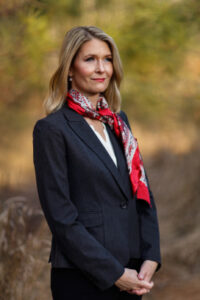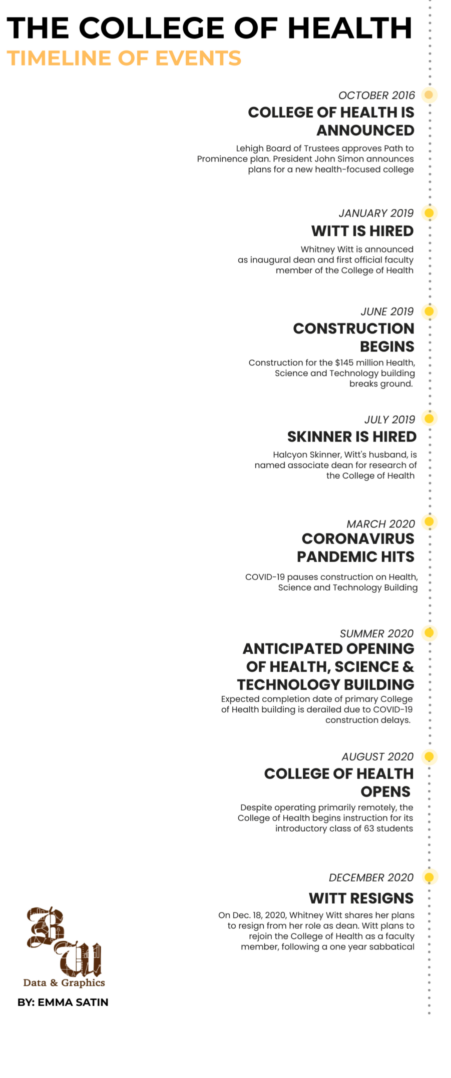In January 2019, Whitney Witt signed on as inaugural dean of Lehigh’s College of Health.
The college sat at the forefront of Go: The Campaign for Lehigh, a $1 billion initiative to fund Lehigh’s Path to Prominence expansion goals. Witt’s hiring served as a significant stepping stone to launching the college from abstract ideas on paper to a reality — while Lehigh eyed the College of Health as key to its vision of a bigger school with newer, more robust academic offerings.
But nearing two years on the job as dean, Witt resigned from her role just months after the College of Health opened on Aug. 1. While Witt’s resignation may have left shockwaves around parts of the university, the news comes after months of grievances and tension in the College of Health — with allegations that the upheaval in the college was tied to Witt herself.
Now, Beth Dolan, a professor of English and the deputy provost for graduate education, will serve as interim dean. Dolan did not return a request for comment for this story.
Provost Nathan Urban announced Witt would rejoin the College of Health as a faculty member following a year long sabbatical. He did not disclose a reason for Witt’s decision to leave her post in his announcement to the campus community.

Whitney Witt (Courtesy of Lehigh University)
In an interview with The Brown and White after Witt stepped down, Urban said Witt’s choice to leave her role as dean was “ultimately her own decision.” In that interview, Urban also declined to comment on Witt’s reasoning for resigning from her role as well as the timeline of events leading up to Dolan’s appointment as interim dean.
Regarding the selection of a new permanent dean, Urban said Lehigh will likely wait until a new president is selected to pursue its search once President John Simon steps down in June 2021.
Neither Urban nor Lori Friedman, Lehigh’s media relations director, would comment on whether Witt would keep her dean’s salary during the course of her sabbatical or receive a professor’s salary despite her resignation as dean taking effect Dec. 18.
Within the college’s inaugural six months, three of the six College of Health faculty members have considered leaving their posts or had been actively looking for new work, at least up until Witt’s resignation, citing such tension and hostility within the college.
In particular, the three faculty members speaking out claim that an adversarial relationship with Witt had driven their concerns. Witt did not return three emails and a phone call seeking comment for this story.

Sean Daley, an untenured professor of practice in the College of Health, and Christine Daley, a professor in the College of Health, have given thought to leaving the college since they started their jobs over the summer. A third College of Health faculty member, who wished to remain anonymous for fear of retaliation, has given thought to leaving as well. Sean Daley and Christine Daley are married.
The three College of Health faculty members, who each spoke independently with The Brown and White before the announcement of Witt’s resignation, cited a number of issues, including perceived mistreatment of the college’s faculty and a hostile atmosphere created by Witt, concerns over the vision of the college, and discomfort with the leadership structure of the college and the ability for faculty to redress grievances given that Witt’s husband is the associate dean of the college.
Regarding alleged complaints made against Witt, Urban said concerns are not uncommon.
“There are always things that people raise concerns about,” he said. “But the strong message was that the college has really done a lot in a short period of time and Dean Witt has been the driving force behind that.”
The Brown and White reached out to the remaining three College of Health faculty members and the staff members in the college’s dean’s office regarding the culture in the college while Witt was dean. None of the remaining College of Health faculty or staff offered comment on the situation involving Witt when asked. These individuals were asked to comment both before and after Witt’s resignation was announced.
“I have already looked into other positions. I have already put feelers out and have already looked into things. I don’t have any intention today of leaving tomorrow.”
-Christine Daley, a professor in the College of Health, on her thoughts of potentially leaving her role prior to Witt’s resignation as dean
Upon hearing of Witt’s resignation, Sean Daley shared well wishes.
“I wish (Dr. Witt) well and thank her for bringing me aboard here at Lehigh,” he said. “I am looking forward to working with Dr. Dolan and continuing to build the College of Health.”
Witt’s resignation came after months of dissatisfaction with her leadership in the college, which was allegedly known among officials at high levels at Lehigh. All three faculty members who spoke to The Brown and White about their concerns say they raised those concerns with university administration, including Provost Nathan Urban. Two members of Lehigh’s Faculty Senate acknowledged they have concerns themselves or have heard concerns either in general about the College of Health or in particular about the relationship between Witt and her husband, Halcyon Skinner.
“If it doesn’t get better by spring, I’m leaving,” the anonymous College of Health faculty member said in a November interview before Witt stepped down. The faculty member wished to speak anonymously, fearing potential retaliation from Witt when she was still dean and preferred to stay anonymous after Witt’s resignation.
The turmoil at the college has prompted Christine Daley to also give thought to leaving Lehigh — just five months after starting.
“I have already looked into other positions,” Christine Daley said in a November interview. “I don’t have any in the works right now; there’s not a lot out there to be perfectly honest. But I have already put feelers out and have already looked into things. I don’t have any intention today of leaving tomorrow … I actually feel wonderfully supported by the greater university. And honestly the students at Lehigh are wonderful. So that is what’s keeping me here. And I have hope that the administration is going to rectify our situation as a college and that will keep me here. If things don’t change, though, it feels very hostile at work.”
For Sean Daley, he said it’s frustrating given what could have been.
“This should be an incredibly happy time for everyone involved — a time when we’re all celebrating and we’re all excited and trying to work toward something together for the benefit of the Lehigh community and Lehigh Valley as a whole — and it’s not that,” he said before Witt stepped down. “It’s a hugely problematic situation. There are a lot of issues.”
For one, the anonymous College of Health faculty member said meetings with Witt when she was dean were often inappropriate in tone and conduct.
“The feedback given, particularly from the dean, is very negative,” the source said. “Downright hostile at times. There’s an atmosphere, when that person is in a meeting or a room, that you should not speak unless spoken to. There’s yelling, there’s screaming, there’s cursing, there’s talking poorly about other people on campus, there is targeted or harassing questions.”
Christine Daley said more bad signs emerged on her first day, Aug. 1. That’s when Witt sent out an email to the college’s faculty that called out one colleague “by name in a very negative way,” which the anonymous College of Health faculty member confirmed happened and said it could only have been for the purpose of “embarrassing” that colleague.
Christine Daley called Witt to discuss the situation and why she felt that was inappropriate.
“It’s a hugely problematic situation. There are a lot of issues.”
-Sean Daley, a professor of practice in the College of Health, on the culture in the college
“She kind of laughed it off and said it’s all fine. And that was, I think, the biggest red flag because it was our first day here. We kind of chalked everything up to stress,” Christine Daley said. “And then it was just over time, the sort of erratic behavior became concerning.”
Under Witt’s leadership, there were additional concerns regarding the future of the college.
Christine Daley said she was hired to Lehigh’s College of Health under the premise that she would be able to be part of building a brand new college that is responsive to modern-day needs and challenges in the health field.
With that promise in mind, Christine and Sean Daley moved their family from Kansas, where they were working as professors and research partners, to Bethlehem. Christine Daley was working at the University of Kansas School of Medicine, and Sean Daley was working at Johnson County Community College.
But in practice, she said she doesn’t feel she’s been given the latitude that drew her to the position because faculty in the college didn’t “feel very free” to express their ideas under Witt.
“This college is being designed very much — it’s (Witt’s) vision,” Christine Daley said before learning of Witt’s resignation. “And she is the dean. She should have a vision. But our visions should be included in that, as well. That’s why we came here, and that’s why we were hired. And I don’t feel like it’s a collaborative discussion among the faculty. It feels very much like, ‘This is the vision, and we’re going to fulfill it, and that’s it.’ For many of us, the reason we came here was because we wanted to build something new and different and that we had ideas and that we wanted to try out our ideas.”
Before coming to Lehigh in January 2019, Witt worked most recently at IBM Watson Health as the director of the Center for Maternal and Child Health Research. She has in the pastheld “full time academic appointments” at Harvard Medical School, Northwestern’s Feinberg School of Medicine and the University of Wisconsin School of Medicine and Public Health.
Seven months after Witt’s hiring, Skinner, Witt’s husband, was hired as associate dean of the College of Health. Friedman said Witt was not involved in Skinner’s hiring. Skinner has also worked at IBM, Northwestern and the University of Wisconsin. Witt and Skinner’s LinkedIn accounts indicate the two overlapped while employed at IBM, Wisconsin and Northwestern.
Skinner also did not return three emails and a phone call seeking comment for this story.
Andrew Hellpap, a media strategist at the University of Wisconsin-Madison, said in an email that Witt and Skinner did not have any supervisory relationship to each other while working as faculty between 2006 and 2013. The Brown and White reached out to every faculty member of Wisconsin’s 28-member department of population health sciences. None agreed to be interviewed for this story.
IBM did not return a request for comment.
“For many of us, the reason we came here was because we wanted to build something new and different and that we had ideas and that we wanted to try out our ideas.”
-Christine Daley on the vision of the College of Health and what brought her to her current role
The three Lehigh faculty members have pointed to Witt’s recent background in industry as a source of friction. To those faculty members, that transition back into academia wasn’t a smooth one.
Sean Daley said the College of Health had adopted a “top-down industry model” that had become “problematic.”
“If you tell someone from academia to do A, B and C, we want to know why we’re doing A, B and C, and when we’re told, ‘I’m the boss, do A, B and C,’ you’re going to get push-back, and that’s not going to make for a good working relationship,” Sean Daley said. “So, taking that industry model, if you don’t do what you’re told, you kind of get put on the back burner, you’re not going to be prized, you’re not going to be valued, you’re going to be seen as an obstacle or an impediment, so you’re going to be pushed to the side.”
The three faculty members said one instance in which this “top down” mindset went too far was Witt’s request to view the details of her faculty members’ calendars so she could allegedly have the ability to “change people’s schedules to fit hers.”
Christine Daley said she brought her privacy concerns to Jackie Krasas, the deputy provost for faculty affairs, who assured her she would not be “breaching any Lehigh policies by refusing” to share the details of her daily calendar. Sean Daley said he also independently confirmed with university administration that he was “not out of line” by refusing Witt’s request.
The personnel in place at the top of the college was also cause for concern among some faculty members, given the marital relationship between Witt and Skinner. Their personal relationship combined with the fact that Skinner serves as associate dean of the College of Health while Witt was dean of the college had raised questions of conflict of interest and nepotism, for which Lehigh’s policies are listed in the 2019-2020 Faculty Resource Guide.
“It creates an opportunity for people to try to make sense of interactions and decisions in a way that may not be reflective of reality because they’re processing that through a lens of, ‘Well, it’s because they’re in a marital relationship. That’s why they’re acting this way.’”
–Doug Mahony, an associate professor of management, on the relationship between Witt and Skinner
The nepotism policy states in part that “no individual shall be employed in a department or area under the supervision of an immediate relative who has, or may have, a direct or indirect effect on the individual’s progress, performance or welfare.” The policy also states faculty and staff members can’t initiate or participate in “university decisions involving a direct benefit to their relatives.”
While an associate dean of a college might typically directly report to that college’s dean, Friedman said the university took steps to ensure that wasn’t the case in the College of Health given Witt and Skinner’s marital relationship, which she said was “widely known from the start.” Friedman said Skinner instead reports to Krasas, which “ensures compliance” with Lehigh’s policies.
Despite Freidman’s statement that the marriage between Witt and Skinner is “widely known,” the university has evaded such information in the past to the public. In a press release announcing Skinner’s appointment as associate dean in late July 2019, Witt and Skinner praised one another on various accolades and achievements while failing to mention their marriage.
Friedman said dual career recruiting is common in academia “where job qualifications are highly specialized.” She said each situation is assessed differently to “try to find solutions that avoid nepotism while also not disadvantaging the applicant.”
Urban said the relationship between Witt and Skinner was not of any concern to him because the leadership structure was designed to prevent Skinner from ever reporting to Witt. Both Witt and Skinner were hired before Urban started at Lehigh this past June.
“That was set up when (Skinner) first joined and has been in place since then, so that was not something of particular concern because there was no direct supervisory relationship,” he said.
Even still, the structure had several members of the Lehigh community feeling uncomfortable with the decision to place Skinner as the College of Health’s associate dean given his wife’s role as the college’s dean.
While Sean Daley said he has no issues going outside of the college with concerns and has generally felt supported by the university at large, that support has not filtered down to his own college.
“Under normal circumstances, we would have a department chair, we would have multiple assistant deans, associate deans, whatever structure was used,” Sean Daley said. “So we would have multiple layers of protection, multiple avenues to express concerns, to address problems we’re having, and right now, we don’t have that.”
In reality, Sean Daley said the leadership structure of the college given Witt and Skinner’s marriage meant faculty members had to “jump way over everyone’s heads” when they had concerns that they wanted heard without potential consequence.
“I work with my wife,” Sean Daley said. “Me and my wife have been research partners for 25 years. The reality is when you’re married and you work together, those lines get blurred sometimes. And we’re just regular old faculty. When you’re talking dean level, department chair level, that’s a problem for the faculty when they don’t have anyone to go to.”
Doug Mahony, a former Faculty Senate chair and an associate professor of management, said his initial reaction to the leadership arrangement in the College of Health was “one of concern” — not because Witt and Skinner would personally be ineffective or problematic, but because of the perception of such a structure.
Mahony said he looks at management decisions through the lens of how a prudent employer would act, as well as the implications from a liability perspective.
“It creates an opportunity for people to try to make sense of interactions and decisions in a way that may not be reflective of reality because they’re processing that through a lens of, ‘Well, it’s because they’re in a marital relationship. That’s why they’re acting this way,’” Mahony said. “That’s what organizations need to avoid.”
Kathy Iovine, the chair of the Faculty Senate, said in a statement prior to Witt’s resignation that “to the extent that there are any concerns around the College of Health, the provost is aware and he is working to resolve them.”
According to the anonymous College of Health professor, the source has personally raised concerns about the college to Urban. Sean Daley has also contacted Urban and Krasas and has been satisfied with the response, leaving some hope that issues in the college could be resolved.
“Sometimes there’s that barrier between faculty and administration, and I can honestly say in my experience, any concerns I have about looking for employment elsewhere, they’ve been tempered for the time being after dealing with them and working with them on some of my concerns,” Sean Daley said.
This report was compiled by The Brown and White’s Investigative Team.






Comment policy
Comments posted to The Brown and White website are reviewed by a moderator before being approved. Incendiary speech or harassing language, including comments targeted at individuals, may be deemed unacceptable and not published. Spam and other soliciting will also be declined.
The Brown and White also reserves the right to not publish entirely anonymous comments.
3 Comments
This article cleared up the “chasm” comment made in the other article. Highly unusual to have such a a relationship in charge of overseeing an entity. Not not think that there wouldn’t be problems with such a structure was highly naive. Academia cannot be run like a Fortune 500 company. I can see why there are problems. Hopefully, this has been nipped in the bud and the College will be able to flourish.
Why, why do I have a feeling that “wonderful opportunities” were not the only reason the Daleys left Kansas.
They’ve come to a half-built college with almost no one in it, and are now frightened academics who’re complaining that they don’t have protection of all the normal admin infrastructure that doesn’t exist yet? And they didn’t like the tone of an email. And after decades in academia, they don’t know anything about what happens when business types show up to run things, even though academia’s riddled with biz people hired to inject biznesslikeness.
What I will say is that they’re masters of the language of faculty victimhood — note that nothing here has actually happened beyond being asked to open their calendars and not getting the influence they wanted — and have rapidly made the complaint rounds over things that normal fac would just refuse or manage, and are talking to a B&W reporter to dish on someone who’s still going to be a colleague, unless she’s recycled as other admin. They’re research partners, middle-aged, would guess much angst in Kansas about not getting support for their research at Kansas, showed up here & found the CoH would not be built around their research either, decided it was them or Witt. Someone’s made enough stink for Urban to tell her to be invisible for a year. And now an English professor’s interim dean? Of the Health College? What a mess.
I don’t think you got the story, but if the real one has anything to do with these two, I don’t think it’s going to be very interesting. It sounds like Witt got mugged, frankly. If that’s it, that should give them trouble recruiting. News should be out anyhow as a result of your reporting. (Why is Urban scared of Christine Daley? Did she threaten to sue?) I mean they’ve got the building, they absolutely must make something happen there.
Yeah, too much is missing from this story. A thing, though: it’s not the first time Lehigh’s done this recently, with getting academic outsiders of one kind or another to show up and build things they can’t build — they don’t have the firepower, they don’t have the cv, they don’t have serious institutional support. And I’m curious where that direction’s coming from.
Also wondering how desperado the Daleys’ research sit is. Brb.
Ah. After many years mining a research vein to do with indigenous ppl and smoking, Daley’s moving up at NIH, finally has has two of the big investigator grants. NIH is very serious about institutions supporting researchers: they don’t fund without evidence.
My guess: Daley moved far from her research territory to be here, thought she could set up solid and with room to grow, found it’s not her show at all, maybe found her boss doesn’t understand midcareer NIH serious funding paths, is discovering what an R2 is, probably has arguably misleading emails suggesting she’d have all the room & support she needs, has been blowing a gasket for months, seeing a hard-won career being endangered just when it’s really kicking in, is also maybe not getting the respect she wants. Urban wants the expensively-hired researcher with something like $6m in current grants & the likelihood of more to calm down & stay, also does not want NIH to think Lehigh is a clown car. Also, she’s handing you serious baloney about what the trouble is, or she told you in inaudible academic terms and you missed the significance. But it sounds to me like she wanted Witt out of the way of her research career and won.
Emma, Jordan, see grantome.org, then RePORT at NIH. Also, this is part of why hiring from biz goes poorly. When deans don’t understand faculty careers, it’s a problem. Is also why an English prof is the wrong interim. They need a real academic health sci person in there who knows the territory. In other words, this isn’t about the married thing. The married thing is ammo. If Witt were keeping Daley happy, it wouldn’t matter.
The thing is, this CoH will have a heavy regional health-biz orientation. That’s Lehigh. Indigenous smoking cessation that’s heavy on sociology is not big biz, that’s govt-contract work forever. So I’d have questions about the recruiting strategy in the first place. What’s this CoH want to be? Who are they modeling it on?
Lehigh’s also really very far from Kansas and her research subject communities and hasn’t got the kind of infrastructure that’s supported her research so far. Something wasn’t happening for her there, too. Otherwise there’s no obvious reason why she’d make the move.